#Charles Haddon Spurgeon
Quote
Convertam cada coisa que possa ser um motivo de ansiedade em um motivo de oração. Não passará muito tempo até que tenham um motivo de ansiedade, assim não passará muito tempo sem que tenham um tema de oração. Eliminem esta palavra: “ansiedade”, e escrevam simplesmente em seu lugar esta palavra: “oração”; e então, embora suas preocupações sejam múltiplas, suas orações também serão múltiplas.
C. H. Spurgeon, no sermão “Oração, um remédio para a ansiedade”.
#C. H. Spurgeon#charles spurgeon#Spurgeon#oração#ansiedade#preocupação#cristão#Deus#jc#fav#♥#Charles Haddon Spurgeon
38 notes
·
View notes
Quote
The wide awake man seizes opportunities or makes them, and thus those who are widest awake usually come to the front.
Charles Haddon Spurgeon
#quotes#Charles Haddon Spurgeon#thepersonalwords#literature#life quotes#prose#lit#spilled ink#inspirational-quotes
23 notes
·
View notes
Text
“A incredulidade tem mais fases que a lua, tem mais cores que um camaleão. O povo costuma dizer que, às vezes, viu o diabo de uma forma, outros de outra. Estou certo de que isso é verdade quanto à primogênita de Satanás, a incredulidade, pois suas formas são legião. Às vezes, eu a vejo disfarçada de anjo de luz, ela chama a si mesma de humildade e diz: ‘Seria presunção da minha parte! Não ouso pensar que Deus poderia me perdoar. Tenho pecados demais!’ Chamamos a isso de humildade e agradecemos a Deus por nosso amigo estar em tão boas condições. Eu não agradeço a Deus por esse tipo de ilusão. É o mal disfarçado de anjo de luz. No fim das contas, é pura incredulidade”. (SPURGEON. Charles H. – Sermão n.º 3: – O Pecado da Incredulidade, manhã de 14 de janeiro de 1855, New Park Street Chapel)
8 notes
·
View notes
Text
Grace is the mother and nurse of holiness, and not the apologist of sin.
- Charles Haddon Spurgeon
11 notes
·
View notes
Text
Our Lord has said, “If a man keep my saying, he shall never see death”; and this does not relate to the few who will remain at His second advent, but to the entire company of those who have kept His saying, even though they pass into the grave. What does this promise mean? It means this, in the first place: our face is turned away from death. Here am I, a poor sinner, convinced of sin, and aroused to a fear of wrath. What is there before my face? What am I compelled to gaze upon? The Greek is not fully interpreted by the word “see”: it is an intenser word... the sight here mentioned is that of “a long, steady, exhaustive vision, whereby we become slowly acquainted with the nature of the object to which it is directed.” The awakened sinner is made to look at eternal death, which is the threatened punishment of sin. He stands gazing upon the result of sin with terror and dismay. Oh, the wrath to come! The death that never dies! While unforgiven, I cannot help gazing upon it, and foreseeing it as my doom. When the gospel of the Lord Jesus comes to my soul, and I keep His saying by faith, I am turned completely round. My back is upon death, and my face is towards life eternal. Death is removed; life is received; and more life is promised. What do I see within, around, and before me? Why, life, and only life— life in Christ Jesus.
Charles Haddon Spurgeon
#charles haddon spurgeon#Hope#Death#Life#do not despair#the joy of the gospel#i can attest to this#every saint has a past and every sinner has a future#the wages of sin is death#Jesus Christ came into this world to save sinners
6 notes
·
View notes
Text
"Somente os tolos acreditam que política e religião não se discute. Por isso os ladrões continuam no poder e os falsos profetas continuam a pregar."
Charles H. Spurgeon.
#Vi#Charles Spurgeon#charles h. spurgeon#charles haddon spurgeon#charles spurgeon#C H Spurgeon#Spurgeon#c.h. spurgeon#frases cristãs#frasesteologicas#Politica e religião#Política
50 notes
·
View notes
Text
A Constant Witness
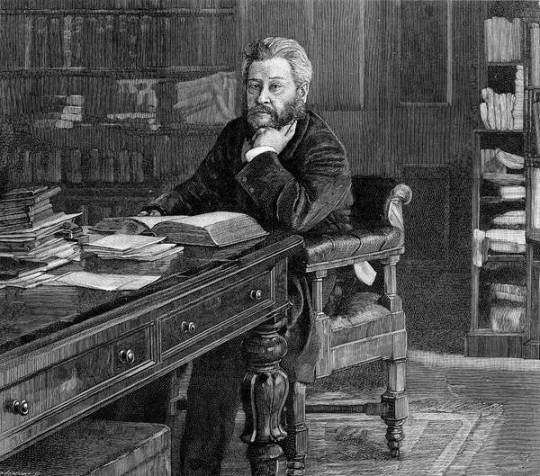
by Charles Spurgeon
"For thou shalt be his witness unto all men of what thou hast seen and heard."
- Acts 22:15
Paul was chosen to see and hear the LORD speaking to him out of heaven. This divine election was a high privilege for himself; but it was not intended to end with him; it was meant to have an influence upon others, yea, upon all men. It is to Paul that Europe owes the gospel at this hour.
It is ours in our measure to be witnesses of that which the LORD has revealed to us, and it is at our peril that we hide the precious revelation. First, we must see and hear, or we shall have nothing to tell; but when we have done so, we must be eager to bear our testimony. It must be personal: "Thou shalt be." It must be for Christ: "Thou shalt be his witness." It must be constant and all absorbing; we are to be this above all other things and to the exclusion of many other matters. Our witness must not be to a select few who will cheerfully receive us but to "all men" -- to all whom we can reach, young or old, rich or poor, good or bad. We must never be silent like those who are possessed by a dumb spirit; for the text before us is a command, and a promise, and we must not miss it -- "Thou shalt be his witness." "Ye are my witnesses, saith the LORD."
#Charles Haddon Spurgeon#Faith's Checkbook#devotional#A Constant Witness#Acts 22:15#February 10#2023
9 notes
·
View notes
Text
The Saint's Trials and the Divine Deliverances - Charles Spurgeon Audio Sermons (Psalm 77:1–20)
The Saint’s Trials and the Divine Deliverances – Charles Spurgeon Audio Sermons (Psalm 77:1–20)
▶️Charles Spurgeon Sermon Playlist:https://www.youtube.com/playlist?list=PLCDB844A9113F938C
Charles Haddon (C.H.) Spurgeon (June 19, 1834 January 31, 1892) was a British Reformed Baptist preacher who remains highly influential among Christians of different denominations, among whom he is still known…
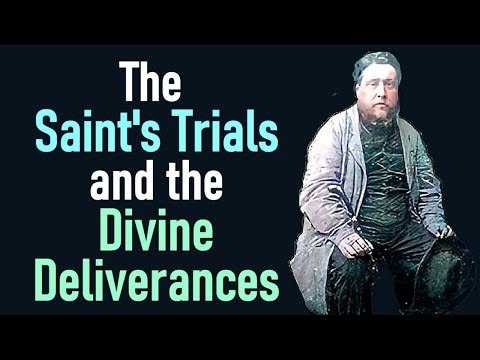
View On WordPress
#Bible#Book of Psalms#c. h. spurgeon#C.H. Spurgeon#Ch Spurgeon#CHARLES HADDON SPURGEON#Christian#Christianity#God#Jesus#Jesus Christ#pastor#preacher#psalm#Psalms#suffering
0 notes
Text
A piedade doméstica é o melhor da piedade. Se nossa luz não é vista em nossa casa, é porque provavelmente não temos nenhuma.
Charles Haddon Spurgeon
24 notes
·
View notes
Text
"It will be a sad day for the church and the world when there is no distinction between the children of God and those of this world."
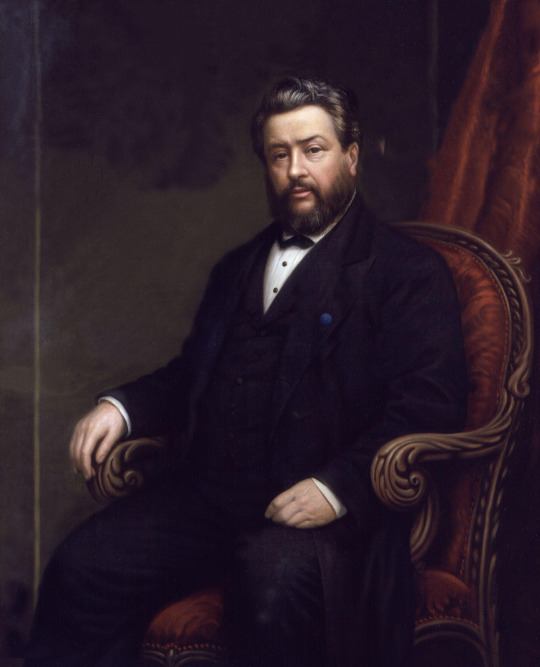
Charles Haddon Spurgeon was an English Particular Baptist preacher. Spurgeon remains highly influential among Christians of various denominations, to some of whom he is known as the "Prince of Preachers."
Born: 19 June 1834, Kelvedon
Died: 31 January 1892 (age 57 years), Menton, France
Prolific Preacher: Charles Spurgeon was one of the most prolific preachers of the 19th century, delivering thousands of sermons. His powerful and eloquent preaching earned him the title "Prince of Preachers."
Metropolitan Tabernacle: Spurgeon became the pastor of the Metropolitan Tabernacle in London in 1861, where he preached to large congregations. The Tabernacle became one of the most famous churches in England under his leadership.
Published Works: He authored numerous books, including "The Treasury of David," a commentary on the Psalms, and "Morning and Evening," a popular daily devotional. His sermons were widely published and remain influential to this day.
Philanthropy: Spurgeon was also known for his philanthropic efforts. He founded several charitable organizations, including an orphanage and the Pastor's College (now Spurgeon’s College) to train future ministers.
Calvinist Theology: Spurgeon was a staunch Calvinist and held firmly to Reformed theology. His preaching and writings emphasized doctrines such as the sovereignty of God, salvation by grace, and the perseverance of the saints.
#Particular Baptist#Preacher#Prince of Preachers#English#Theology#Christian#Sermons#Metropolitan Tabernacle#Victorian Era#Evangelism#Calvinism#Baptist Ministry#Pastor#Religious Author#Influential#Homiletics#Gospel#Reformed Tradition#Spiritual Leader#19th Century Christianity#today on tumblr#quoteoftheday
8 notes
·
View notes
Text

“Charles Haddon Spurgeon, a renowned 19th-century British preacher, was known for his compelling sermons and profound understanding of human spirituality. Among his many thought-provoking statements, one particular quote stands out: “Faith goes up the stairs that love has built and looks out the windows which hope has opened.” This powerful statement encapsulates the interconnected nature of faith, love, and hope, highlighting their importance in our spiritual journey. In this article, we will explore the deeper meaning of Spurgeon’s words and how they can inspire us to lead more fulfilling lives.”
Read more at the link below.
13 notes
·
View notes
Text
"It would be easy to show that at our present rate of progress the kingdoms of this world never could become the kingdom of our Lord and of His Christ. Indeed, many in the Church are giving up the idea of it except on the occasion of the advent of Christ, which, as it chimes in with our own idleness, is likely to be a popular doctrine. I myself believe that King Jesus will reign, and the idols be utterly abolished; but I expect the same power which turned the world upside down once will still continue to do it. The Holy Ghost would never suffer the imputation to rest upon His holy name that He was not able to convert the world."
-Charles Haddon Spurgeon
20 notes
·
View notes
Text
“Nestes dias sinto-me compelido a revisar novamente as verdades elementares do Evangelho. Em tempos de paz nós podemos nos sentir livres para fazer passeios em distritos interessantes da verdade, que ficam em lugares longínquos, mas agora temos que ficar em casa, e guardar os corações e os templos da igreja, defendendo os primeiros princípios da fé. Nesta era, têm surgido dentro da igreja homens que falam coisas perversas. Há muitos que nos perturbam com suas filosofias e ‘interpretações de romance’, pelas quais eles negam as doutrinas que professam ensinarem, e minam a fé que prometeram guardar. É bem que alguns de nós, que sabemos o que cremos e que não temos nenhum significado secreto em nossas palavras, devamos apenas firmar nossos pés e manter nossa posição, segurando firmemente a Palavra de vida, e declarando nitidamente as verdades do Evangelho de Jesus Cristo.” (Charles H. Spurgeon)
6 notes
·
View notes
Text
Not even in this world does sin pay its servants good wages.
- Charles Haddon Spurgeon
2 notes
·
View notes
Text
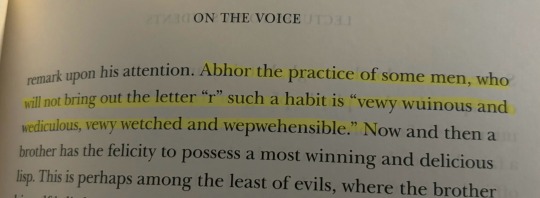
I’m sorry, I’m just trying to wrap my mind around the fact that these words physically came out of the mouth of Charles Haddon Spurgeon.
The Prince of Preachers got up in front of his students and talked like Elmer Fudd.
2 notes
·
View notes
Text
Faith's Checkbook
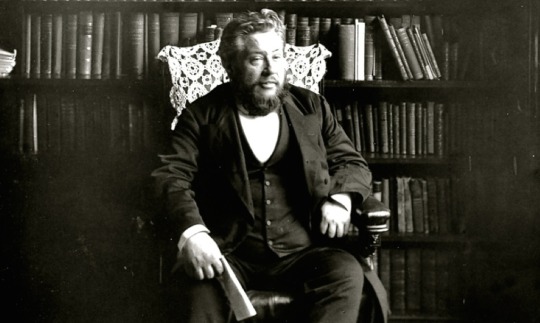
by Charles Spurgeon
Listen for the Signal
And let it be, when thou hearest the sound of a going in the tops of the mulberry trees, that then thou shalt bestir thyself: for then shall the Lord go out before thee, to smite the host of the Philistines.
- 2 Samuel 5:24
There are signs of the LORD’s moving which should move us. The Spirit of God blows where He listeth, and we hear the sound thereof. Then is the time for us to be more than ever astir. We must seize the golden opportunity and make the most we can of it. It is ours to fight the Philistines at all times; but when the LORD Himself goes out before us, then we should be specially valiant in the war.
The breeze stirred the tops of the trees, and David and his men took this for the signal for an onslaught, and at their advance the LORD Himself smote the Philistines. Oh, that this day the LORD may give us an opening to speak for Him with many of our friends! Let us be on the watch to avail ourselves of the hopeful opening when it comes. Who knows but this may be a day of good tidings; a season of soul-winning. Let us keep our ear open to hear the rustle of the wind and our minds ready to obey the signal. Is not this promise, "Then shall the LORD go out before thee," a sufficient encouragement to play the man? Since the LORD goes before us, we dare not hold back.
#Faith's Checkbook#devotional#Charles Haddon Spurgeon#Listen for the Signal#2 Samuel 5:24#May 3#2023
5 notes
·
View notes